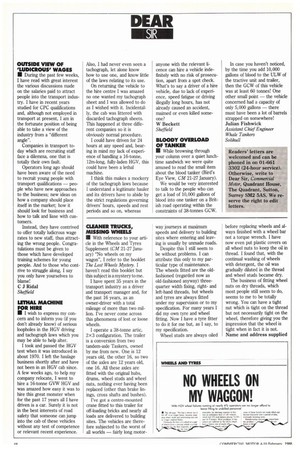CLEANER TRUCKS, MISSING WHEELS • With reference to your article
Page 50

If you've noticed an error in this article please click here to report it so we can fix it.
in the Wheels and Tyres Supplement (CM 21-27 January) "No wheels on my wagon", I refer to the booklet The Lost Wheels Mystery, I haven't read this booklet but this subject is a mystery to me.
I have spent 35 years in the transport industry as a driver and transport manager and, for the past 16 years, as an owner-driver with a total mileage of more than two million. I've never come across this phenomena of lost or loose wheels.
I operate a 38-tonne artic, 2x3 configuration. The trailer is a conversion from two tandem-axle Tankers, owned by me from new. One is 12 years old, the other 16, so two of the axles are 12 years old, one 16. All these axles are fitted with the original hubs, drums, wheel studs and wheel nuts, nothing ever having been replaced (other than brake linings, cross shafts and bushes).
I've got a centre-mounted crane fitted to this trailer for off-loading bricks and nearly all Loads are delivered to building sites. The vehicles are therefore subjected to the worst of all worlds — fairly long motor way journeys at maximum speeds and delivery to building sites where entering and leaving is usually by unmade roads.
Despite this I still seem to be without problems. I can attribute this only to my particular type of maintenance. The wheels fitted are the oldfashioned (regarded now as old-fashioned anyway) threequarter width fixing, rightand left-hand threads, but wheels and tyres are always fitted under my supervision or to my specification. For many years I did my own tyre and wheel fitting. Now I have a tyre fitter to do it for me but, as I say, to my specification.
Wheel studs are always oiled before replacing wheels and always finished with a wheel bar not a torque wrench. I have now even put plastic covers on all wheel nuts to keep the oil in thread. I found that, with the continual washing of wheels with detergent, the oil was gradually diluted in the thread and wheel studs became dry.
The business of fitting wheel nuts on dry threads, which most people still seem to do, seems to me to be totally wrong. You can have a tight nut which is tight on the thread but not necessarily tight on the wheel, therefore giving you the impression that the wheel is tight when in fact it is not. Name and address supplied




















































































